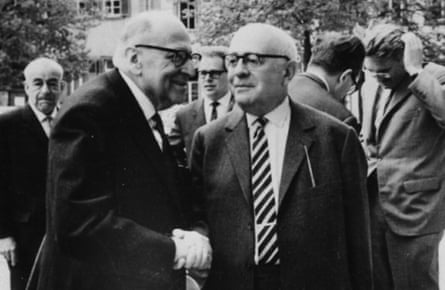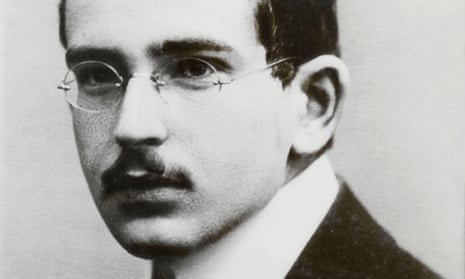The story goes that when the German revolution of 1918 failed to abolish capitalism, Marxist intellectuals, centred around the Institute of Social Research in Frankfurt, decided to achieve their aims by other means. They would infiltrate the universities, there to disseminate doubt in authority, family, nation, high culture and capitalism. Stuart Jeffries begins his popular history of the Frankfurt school with this strange version of its origins, favoured by Anders Breivik and the Daily Telegraph. As Jeffries puts it: “It was as if the proletariat had been found wanting and so had to be replaced as revolutionary agent by critical theorists.”
Grand Hotel Abyss – taking its name from the more hardline Marxist philosopher Georg Lukács’s derisive term for the Frankfurt school – attempts something rather daring. It sets out to be an easily accessible, funny history of one of the more formidable intellectual movements of the 20th century. This could be foolhardy, as some of the key concepts of the Frankfurt school are notoriously intractable, but unlike many of their successors in “theory”, the Frankfurt thinkers – at various times, Theodor Adorno, Max Horkheimer, Walter Benjamin, Erich Fromm, Herbert Marcuse, Jürgen Habermas – were lucid writers, enemies of the portentous jargon of existentialism and phenomenology. However, you can be sure that Adorno – or, as he occasionally called himself, “Hektor Rottweiler”, or “Hippo King” – wouldn’t have approved of Jeffries’ jaunty writing style.
This book is a group biography, which starts with the Jewish bourgeois childhoods shared by most of the school’s protagonists, leading to some speculation about Oedipal motivations. This extends even to the manner in which the Institute of Social Research was formed, in the early 1920s. In Jeffries’ telling, it was a gift from the world’s largest grain trader, Hermann Weil, to his son, Felix. Although it had close links early on with the Marx-Engels Institute in Moscow, there was a decision to avoid the controversial name “Institute of Marxism”. The Institute for Social Research was a compromise choice, which didn’t stop it being nicknamed “Cafe Marx”.
The school’s early work, dominated by sociologist Friedrich Pollock and economist Henryk Grossman, was devoted to unsurprising socialist subjects such as “international trade unions, strikes, sabotage”. Jeffries sketches Frankfurt in the 20s, caught between the progressive Weimar era and the horrors that would follow. The home of IG Farben and centre for modernist social housing, it would later become one of the major hubs of the Third Reich; Zyklon B was devised there. Franz Roeckle, the architect of the stripped classical HQ for this Jewish Marxist thinktank, was later a committed Nazi and murderer.
The institute, with its private funding, stayed aloof both from the Social Democratic and Communist parties. “Already in 1923,” when the organisation was formed, Jeffries tells us, “German Marxism resembled the Judean People’s movements in Monty Python’s Life of Brian.” Or not – given that it was divided into two mass parties with hundreds of thousands of members and millions of voters, a division based on genuine political differences. This moment indicates quite nicely the problems with this book: there’s nothing inappropriate about pop cultural references, as readers of Adorno and Horkheimer’s Dialectic of Enlightenment will appreciate – that book shifts from Immanuel Kant to Donald Duck and back. But it helps if they actually elucidate the point being made.
Oddly, given how populist it is – an easy, witty, pacy read – Grand Hotel Abyss is weakest precisely on popular culture and the institute’s engagement with it. This shift came when Horkheimer became the presiding force at the end of the 20s, moving it from political economy to, in his words, “law, customs, fashion, public opinion, sports, leisure activities, lifestyle, etc”. This is cultural Marxism as we know it.
Mostly, however, Jeffries reproduces the standard idea of the institute standing in lofty judgment over mass culture, something that has long been questioned in studies such as Esther Leslie’s Hollywood Flatlands or Frederick J Schwartz’s Blind Spots. The two figures that were occasional residents in the grand hotel, Benjamin and Marcuse, are given their due as enduring influences on the new left and on student movements; but Horkheimer and Adorno remain the forbidding hotel managers.

Horkheimer once contended that “those who cannot speak of capitalism should keep silent on fascism”; Jeffries misunderstands this as a comparison between capitalism and fascism, but he does trace very well the way in which the Frankfurt school and its thinkers were decisively affected by nazism, war and the Holocaust. Though the institute’s inner circle escaped, eventually to California, Benjamin killed himself on the Spanish border, in fear of capture by the Gestapo. Some members even worked for the nascent CIA during the war.
The institute had never had an official line on the USSR, but although some members, such as Grossman, and associates such as Ernst Bloch and Hanns Eisler, would go over to East Germany after 1945, most returned to the rebuilt school in the West. Jeffries is smart in outlining the compromises they made in the process. Adorno and Horkheimer claimed that they would have “long since been killed” had they opted for the GDR. Jeffries makes clear, though, that Horkheimer enforced, first on Benjamin in the late 30s, and later on the young Habermas in the 50s, a regime of mild censorship, coded language, subject avoidance and “Aesopian language” that closely resembled the means by which critical Marxists such as Leszek Kołakowski or Christa Wolf survived within the eastern bloc.
Their reaction to the emergence in the 60s of an explicitly Marxist new left was ambiguous. Horkheimer was horrified, and committed himself to the American struggle against North Vietnam, while Adorno shifted from embracing the student movement to moving suddenly against it, calling the cops on an occupation, which elicited the famous “Busenaktion” when students bared their breasts at him. He died soon afterwards.
Marcuse’s attitude was different. Already, work such as Eros and Civilisation showed a utopian optimism that contrasted with the sombre tone of Adorno’s late writing; and when the student movement arrived, he told Adorno: “I am willing to come to terms with patricide, even though it hurts sometimes.” One of his students was Angela Davis, who is interviewed for the book; she tells Jeffries her writing on such singers as Ma Rainey, Bessie Smith and Billie Holiday was influenced by Marcuse’s “notions of art as a semi-autonomous zone or another dimension where utopias could be imagined”.
From there, though, the temperature drops, as Habermas brings the institute closer to mainstream liberalism, favouring strong institutions and the rule of law. “Only an academic,” Jeffries notes, “could find ‘constitutional patriotism’ inspiring.” The Frankfurt school, which began as a means of spreading revolutionary values, or so its critics – and some of its supporters – would contend, became committed to the defence of European order. For an account of how this happened, a visit to the Grand Hotel Abyss will prove enjoyable. But to go beyond that story, you’ll have to stay longer elsewhere.

Comments (…)
Sign in or create your Guardian account to join the discussion